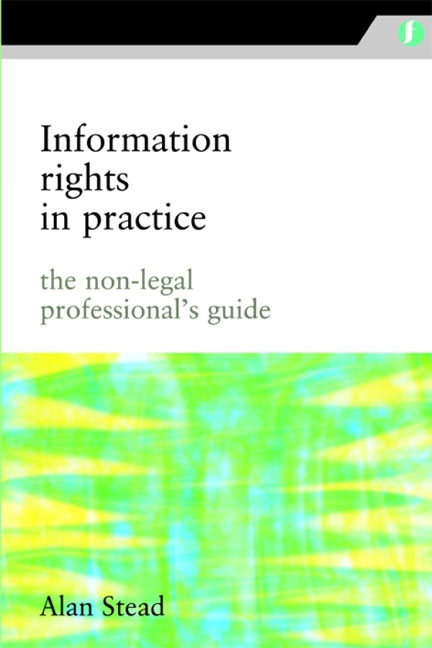Book contents
- Frontmatter
- Contents
- Acknowledgements
- Table of statutes and case law
- Abbreviations
- 1 Introduction
- 2 Data Protection Act 1998
- 3 Definitions of personal data
- 4 The scope of the Data Protection Act
- 5 The data protection principles
- 6 Access to personal data
- 7 Data sharing
- 8 The Freedom of Information Act 2000 and Environmental Information Regulations 2004, SI 2004/3391
- 9 Scope of the Freedom of Information Act 2000 and the Environmental Information Regulations 2004
- 10 Application of exemptions and exceptions
- 11 The public interest test
- 12 Publication schemes
- 13 Compliance, the Information Commissioner and the Information Tribunal
- 14 Disclosure logs
- 15 Records management – Section 46 code of practice
- 16 Other legislation
- 17 Interaction of the legislation
- 18 Summary
- Appendix 1 Data protection principles
- Appendix 2 Flow chart of FOI
- Appendix 3 Exemptions and exceptions under the Freedom of Information Act 2000 and the Environmental Information Regulations 2004
- Appendix 4 Bibliography and useful web addresses
- Appendix 5 Published standards for records management
- Index
15 - Records management – Section 46 code of practice
Published online by Cambridge University Press: 09 June 2018
- Frontmatter
- Contents
- Acknowledgements
- Table of statutes and case law
- Abbreviations
- 1 Introduction
- 2 Data Protection Act 1998
- 3 Definitions of personal data
- 4 The scope of the Data Protection Act
- 5 The data protection principles
- 6 Access to personal data
- 7 Data sharing
- 8 The Freedom of Information Act 2000 and Environmental Information Regulations 2004, SI 2004/3391
- 9 Scope of the Freedom of Information Act 2000 and the Environmental Information Regulations 2004
- 10 Application of exemptions and exceptions
- 11 The public interest test
- 12 Publication schemes
- 13 Compliance, the Information Commissioner and the Information Tribunal
- 14 Disclosure logs
- 15 Records management – Section 46 code of practice
- 16 Other legislation
- 17 Interaction of the legislation
- 18 Summary
- Appendix 1 Data protection principles
- Appendix 2 Flow chart of FOI
- Appendix 3 Exemptions and exceptions under the Freedom of Information Act 2000 and the Environmental Information Regulations 2004
- Appendix 4 Bibliography and useful web addresses
- Appendix 5 Published standards for records management
- Index
Summary
Introduction
Records management is a complete and complex topic in its own right and there are many books and papers already written on the subject. It is not the intention here to replace these publications but to explain, using the code of practice issued under section 46 of the Freedom of Information Act 2000 and guidance issued by The National Archives as a basis, how a public authority must apply the basic principles of records management in the context of information rights.
Good records management is the keystone to the effective management of information rights legislation. Without well-managed records the information that is requested cannot be accessed. A speaker from The National Archives, Susan Healy, states that ‘Records management can survive without information rights but information rights cannot survive without records management’.
There are specific requirements for records management under the information rights legislation. The Data Protection Act 1998 requires under data protection principle 3 that data are adequate and not excessive, under principle 4 that they are accurate and up to date, under principle 5 that they are not kept longer than is necessary and under principle 7 that they are safeguarded from unauthorized access and use. All of these are elements of good records management which are ref lected in the code of practice on records management that the Freedom of Information Act 2000 (section 46) required the Lord Chancellor to issue. The Environmental Information Regulations 2004 also contain requirements affecting records management: regulation 4, for example, requires information to be organized so that it can be easily disseminated and available electronically.
Any organization, whether it is a major public authority or a doctor's surgery, needs to be able to access accurate and reliable records and the code sets out the good practice to achieve that end as well as to support compliance with information rights legislation. Although the code of practice is intended for public authorities covered by the Freedom of Information Act and other bodies that are subject to the Public Records Acts, it is a useful guide and framework to build the management of records in all organizations. It must not be seen as just another code which has to be complied with, but as an invaluable aid to successfully managing records.
- Type
- Chapter
- Information
- Information Rights in PracticeThe non-legal professional's guide, pp. 151 - 168Publisher: FacetPrint publication year: 2008
- 1
- Cited by

